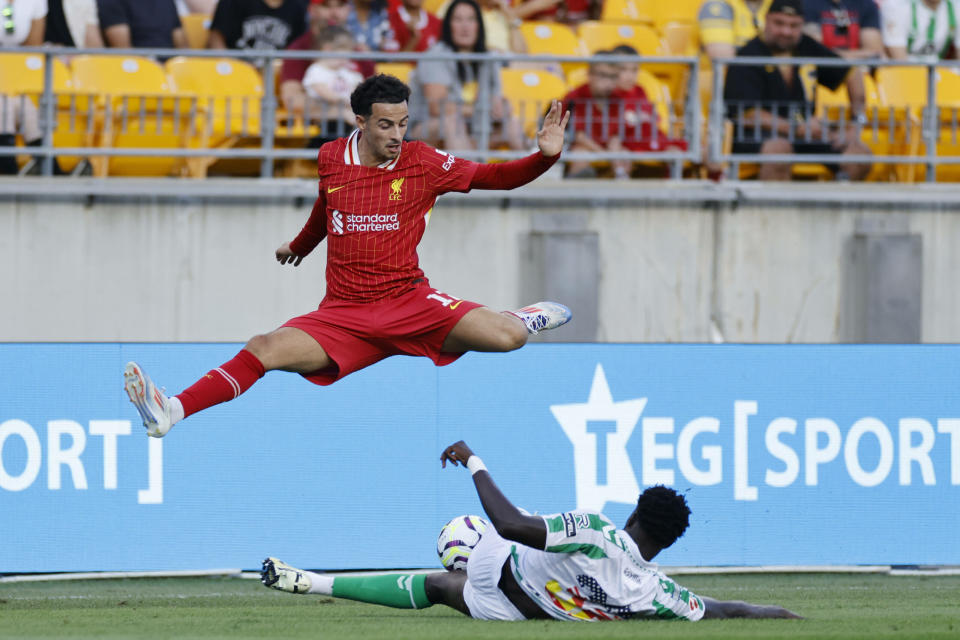David Lynch Reacts to Curtis Jones’ ‘Really Interesting’ Arne Slot Comments

Unpacking Curtis Jones’ Candid Thoughts: The Shift from Klopp to Slot
In the ever-evolving landscape of football, the transition of players under different managers often sparks intriguing debates and insights. David Lynch, speaking on Anfield Index’s ‘Media Matters’ podcast, delved into Curtis Jones’ recent comments on the managerial shift from Jurgen Klopp to Arne Slot at Liverpool. This discussion highlights not only the adaptability of players but also the contrasting philosophies that different coaches bring to the table.
Insight into Jones’ Preference for Slot over Klopp
Curtis Jones, known for his forthrightness, recently expressed a preference for Arne Slot’s approach compared to that of Jurgen Klopp. According to Lynch, “Curtis Jones has always been really honest in interviews, so we should’ve perhaps expected it.” Indeed, Jones’ openness provides a fresh perspective on what it’s like to work under varying managerial styles.
Lynch elaborates on Jones’ thoughts, stating, “He just said what he thought, which is fair enough. He’s not saying that what Jurgen did was terrible, but just more that what Arne Slot is looking to do suits him more.” This distinction is crucial. It’s not about discrediting Klopp’s methods, which have proven successful at Liverpool, but rather about personal fit. Jones evidently sees a better alignment with Slot’s tactics, which possibly offer him more creativity and control on the pitch—elements central to his style of play.
Analysing the Tactical Fit: Klopp vs. Slot
Lynch further discusses the tactical nuances that differentiate Klopp and Slot, noting, “I don’t think Curtis Jones was ever a ‘Jurgen Klopp midfielder’.” This observation is telling. Klopp’s dynamic, high-intensity style may not leave much room for the type of creativity Jones thrives on. In contrast, Slot’s strategy might allow more individual flair and ball possession, which aligns well with Jones’ strengths.

The shift in managerial philosophy is significant, as it not only affects team tactics but also individual player development and satisfaction. Lynch points out, “I think it’s really interesting and tells us that there will be a style change that we all need to get used to.” This change could potentially herald a new era for Liverpool, emphasizing adaptability and perhaps a different route to achieving success.
Player Adaptability and Team Evolution
The discourse around Jones’ comments is a reflection of a broader theme in football: the need for player adaptability. Lynch appreciates the candid nature of Jones’ appraisal, stating, “I prefer to read stuff like that, where he just gave his appraisal, so I thought it was really fascinating.” This kind of honest feedback is valuable as it sheds light on the internal workings of football clubs and the personal experiences of players under different leadership styles.
As football tactics evolve, so too must the players and the teams. Liverpool’s transition from Klopp to Slot is not just about changing personnel but also about adapting to new strategic visions. This adaptation will be key to maintaining competitive performance levels.
Conclusion: Embracing Change in Football Dynamics
Curtis Jones’ candid remarks about the differences between Jurgen Klopp and Arne Slot offer more than just a comparison of two footballing philosophies. They serve as a reminder of the constant evolution within football clubs and the need for players and managers alike to remain adaptable. As Liverpool continues to navigate this transitional phase, the insights from players like Jones will be invaluable in shaping the team’s future strategies and successes.
In conclusion, the conversation highlighted by David Lynch on the ‘Media Matters’ podcast is not just about player preferences; it’s about the broader implications of managerial changes in football. As the game continues to evolve, so too must our understanding of the intricate relationship between a player’s individual needs and a team’s overarching tactics.

 Yahoo Sports
Yahoo Sports 
